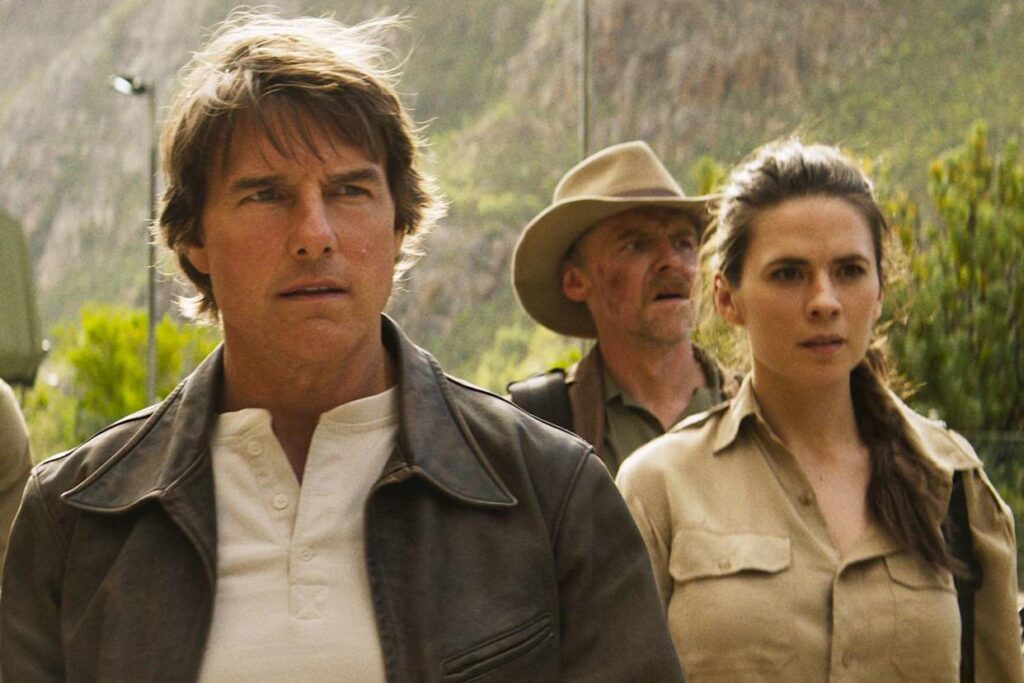
It’s been a long journey for Ethan Hunt. Over 29 years and eight increasingly elaborate movies, he’s gained friends and lost wives, donned masks and exposed traitors, defied superiors while obeying his own code of justice. He’s infiltrated impenetrable buildings and sprinted down the façades of skyscrapers and clung to the wings of aircraft mid-flight. But while his maximal effort has remained constant, the pictures around him have quietly executed a rare and curious mid-series pivot.
For its first decade and a half, the Mission: Impossible franchise comprised essentially four standalone films, unified only by Tom Cruise’s ageless star power. Sure, they shared certain features—globe-trotting hijinks, duplicitous bosses, incredible stunt work, self-destructing messages—but their stories had virtually nothing to do with one another; their styles were also distinct, in part because they were all directed by different people. But with Rogue Nation, Christopher McQuarrie took and then kept the reins, retaining the operatic flair but constructing a more sprawling and interlaced cinematic universe. As its title suggests, The Final Reckoning—the eighth and (presumably) last Cruise-led episode of world-saving and death-defying—is designed to function as a capstone, taking the series to new heights of derring-do while also bringing retroactive meaning and connectivity to its once-independent predecessors.
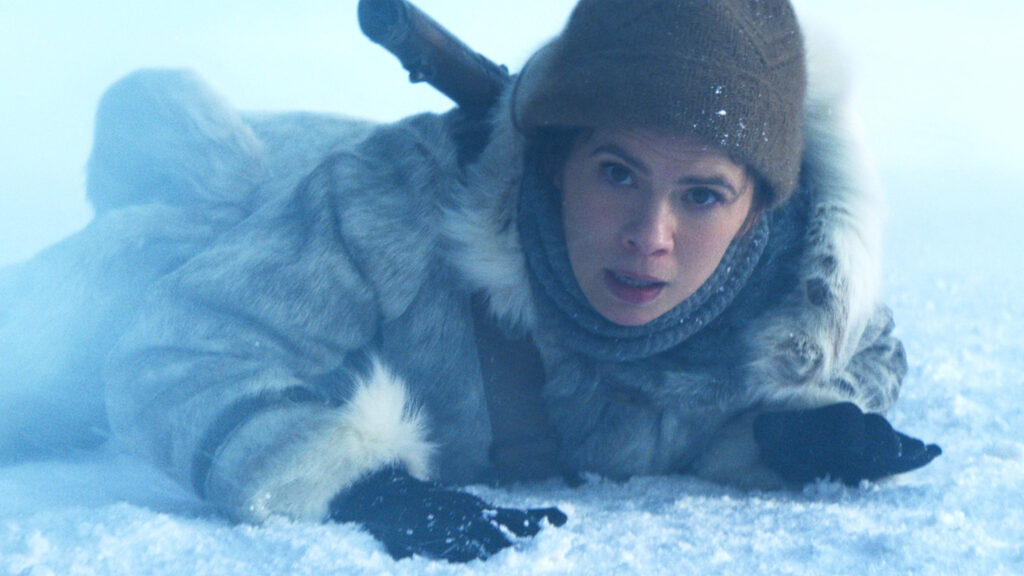
This means that a few too many of The Final Reckoning’s 170 minutes are spent displaying past footage or recontextualizing prior events. Some of this—such as the revelation that Briggs (Shea Whigham), the perpetually exasperated agent who’s always failing to apprehend Ethan, is actually the son of Jim Phelps, the hero of the original 1960s television series who was reimagined as the villain in Brian De Palma’s 1996 feature—is quite silly. Other items, like the renewed significance of the “rabbit’s foot”—the MacGuffin that Philip Seymour Hoffman lusted after in Mission: Impossible III—appear pointless, complicating the franchise’s mythology for no real reason. And others still, like the surprising emergence of a minor figure whom we’d long forgotten—no direct spoilers, but let’s just say radar towers in Alaska don’t man themselves—are oddly touching, even if they behave more as winking fan service than sensible narrative beats.
All told, The Final Reckoning’s expansive reach—its insistence on incorporating side characters and plot points from earlier entries—is misguided but ultimately innocuous. What’s more troubling is its broader approach to storytelling. The movie opens with a blizzard of exposition that recalls a “Previously on” TV bumper, reminding us that a rogue artificial intelligence called “The Entity” has acquired sentience and is now in the process of hijacking the world’s nuclear arsenals. In bold strokes, that’s really all you need to know, but the screenplay (by McQuarrie and Erik Jendresen) still has quite a bit more to say. Some of this, such as the notion that the Entity can destabilize governments by undermining the reliability of information—resulting in a society where nobody know what’s true—carries a sting of contemporary relevance. (It also evokes the second season of Andor, which grappled with the idea more purposefully.) Most of it, though, is simply an avalanche of data—a burst of babble about cruciform keys and compromised operatives and fretfully important disk drives.
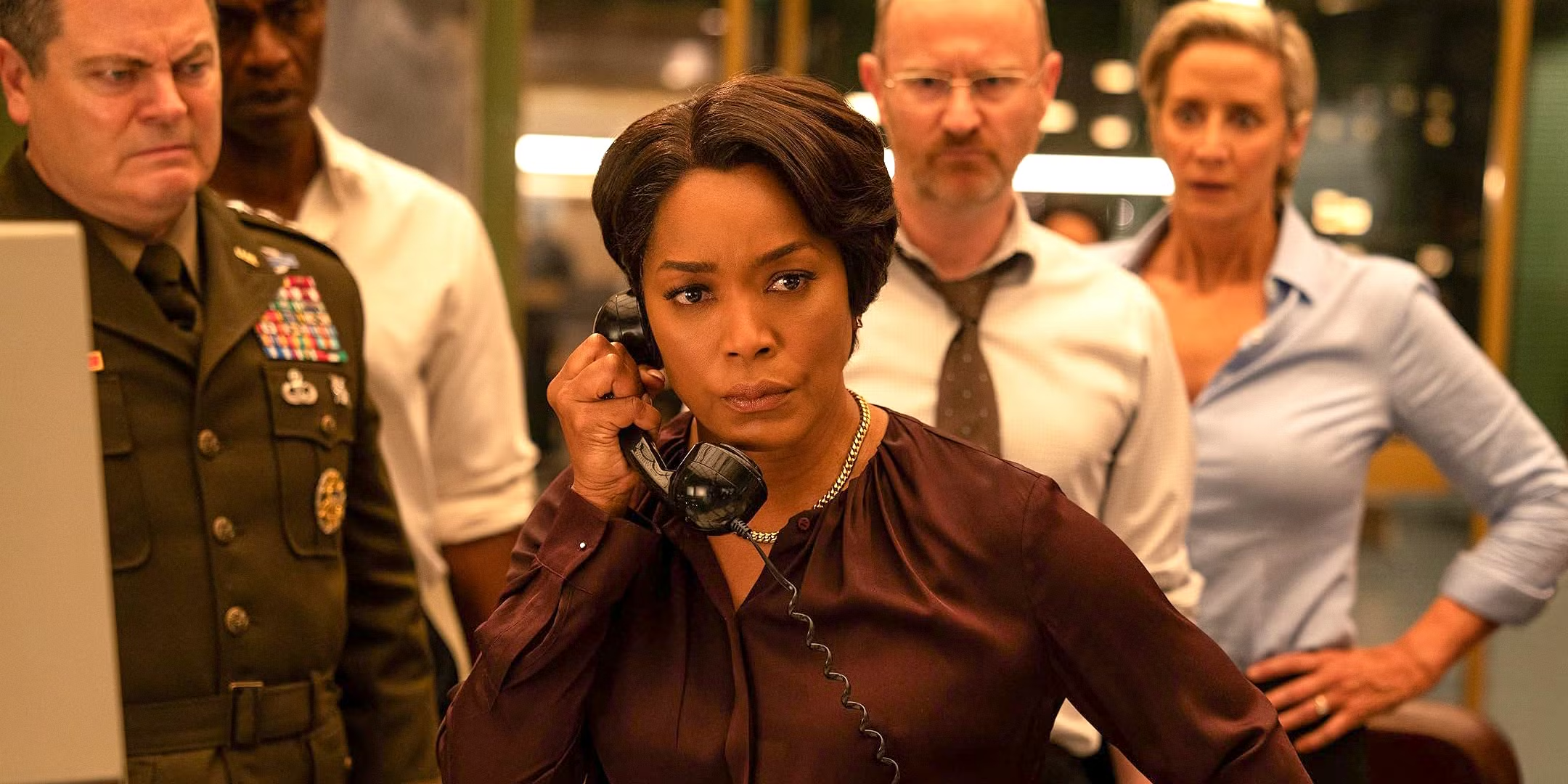
To be fair, no Mission: Impossible movie has ever been digestible on first sitting; in fact, part of the fun is racing your brain to keep up with all of the double crosses and false identities and absurd gizmos. McQuarrie’s ecstatically entertaining earlier episodes—he followed Rogue Nation with Fallout and then Dead Reckoning, all among my favorite action pictures of the new millennium—were similarly complex, but they struck a superior balance between plotty intrigue and kinetic energy. The Final Reckoning is by no means slow, but in its early stretches, its blasts of incomprehensible minutiae bog down its vitality. The Entity, conceived in Dead Reckoning as a fascinating allegorical evil about the perils of A.I., now scans as a weirdly generic apocalyptic threat, its intangibility less tantalizing ambiguity than aesthetic hindrance. And while I’m a sucker for noisy graphics like the giant global map whose territories blink from yellow to red upon succumbing to the Entity’s control, there are too many scenes involving the U.S. President (Angela Bassett) fussily squabbling with her advisors—the overqualified cast includes Holt McCallany, Nick Offerman, and Janet McTeer—recalling standard political thrillers (Fail Safe, Thirteen Days, The Sum of All Fears) without carrying the requisite thematic heft.
The thing is, though: Ethan breaks into a derelict submarine rotting on the ocean floor. With his shirt off.
Look, I’m not suggesting that The Final Reckoning’s gonzo second half renders its narrative shortcomings meaningless. (If it insisted on paying homage to earlier installments, it could have resurrected Rebecca Ferguson’s Ilsa Faust or at least brought back Vanessa Kirby’s White Widow.) But once the movie dispatches with its cumbersome setup, it develops a hurtling momentum that it somehow keeps ratcheting up. It also reinforces McQuarrie’s canny filmmaking skill; yes, his set pieces are explosive, but they also seethe with imagination and variety.
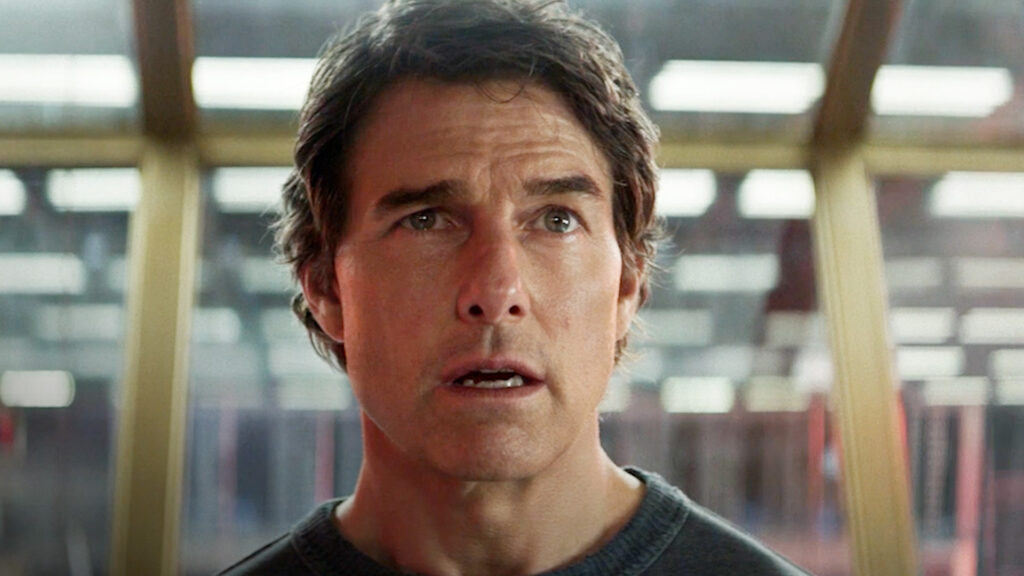
What passes for conventional here is a riveting, two-tiered fight sequence in which Ethan—having boarded one submarine in the hope of using it as a launchpad to penetrate a second submarine, while avoiding getting flattened by a third submarine—engages in sudden fisticuffs with a hidden foe while his trusty team, led by Simon Pegg’s Benji, battles foreign adversaries on a remote arctic island. Structurally speaking, it’s nothing revolutionary, but McQuarrie marshals his elements with brio—key bit players here include Tramell Tillman (from Severance) as a rebellious captain and Katy O’Brian (continuing to flash charisma following Love Lies Bleeding) as a no-nonsense diver—using brilliant cross-cutting to lend the proceedings a relentless dynamism. (The editor is Eddie Hamilton, while the thumping score is courtesy of Max Aruj and Alfie Godfrey.)
The music may be loud, but The Final Reckoning improbably delivers a sequence of showstopping, heart-pounding quiet. The sluggishness inherent to underwater action has long confounded directors (excluding James Cameron in the Avatar sequel), but McQuarrie solved that problem in Rogue Nation and does so again here, in part by embracing the ocean’s crippling inhospitality. The scene where Ethan slowly clambers through chambers and slides down surfaces and crams himself into a fucking torpedo tube is unlike any Mission: Impossible set piece before it: patient, silent, gripping. It also concludes with an image of startling beauty, as Hayley Atwell’s Grace embodies her character’s name, bestowing a tender kiss of life.
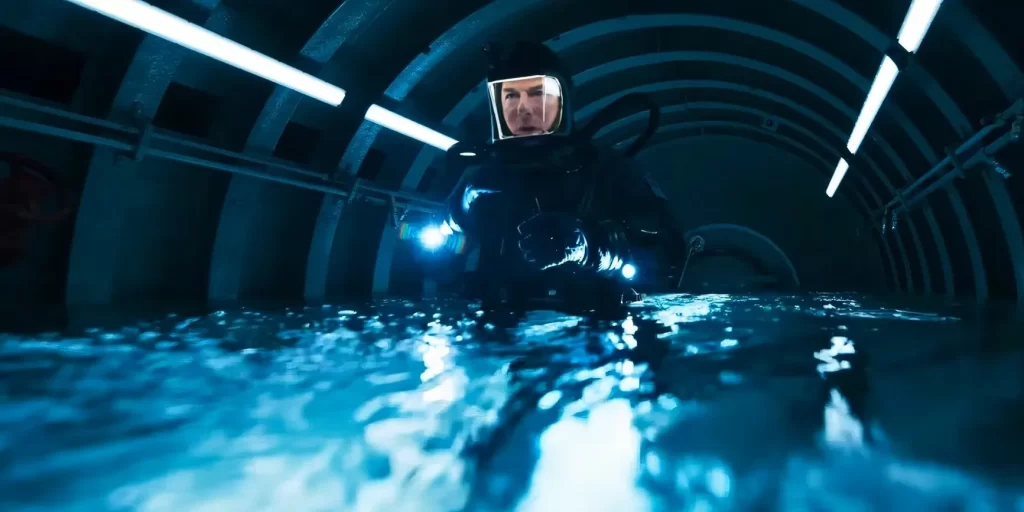
And then there is the climax, in which Benji, Grace, and their enemy-turned-ally Paris (a solid Pom Klementieff) find themselves entangled in a two-for-one genre special, scrambling to defuse a clock-ticking bomb while also performing impromptu surgery on one of their own. Of course, their dual travail is mere window dressing compared to the true attraction: an eye-popping biplane chase in which Ethan acts as both pilot and stowaway, clutching onto wings and vaulting into seats and staring death straight in the face. The sequence is incredible not just for its lucid choreography (note the smart decision to paint the planes a vibrant yellow and red, allowing us to easily distinguish between them), but for its artistic ambition and personal risk.
I have no doubt that some CG technology was used in this scene, and that appropriate safety precautions were taken. But watching it unfold in real time on a big screen, I was struck by an undeniable certainty: that Cruise is up there, doing all of these crazy stunts himself, relinquishing what’s left of his sanity and potentially sacrificing his life for the price of our joy.
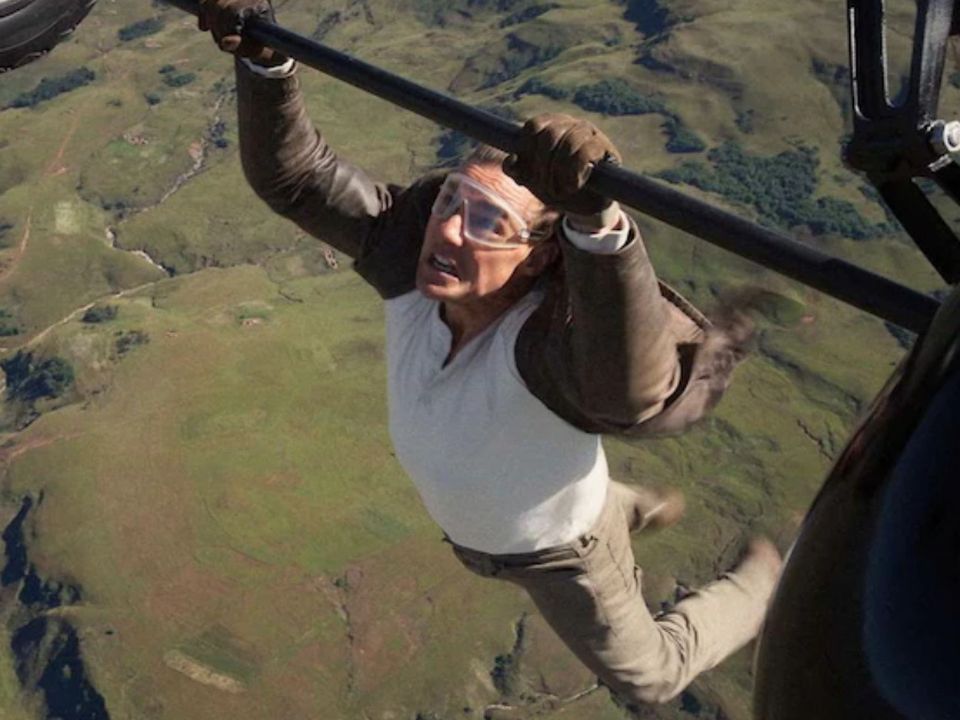
One of the credos of the Impossible Mission Force is that its agents expend their heroic labor “for those we’ll never meet.” Ethan Hunt is fighting to save the world, but Tom Cruise is fighting to save the movies—to reassert the sanctity of an experience in which countless strangers file into dark auditoriums and look up in collective wonder. Admittedly, there’s a mild irony in the Mission: Impossible franchise—an intellectual-property machine with eight installments, originating from a 1970s TV series—positioning itself as the savior of innovative cinema. But as ridiculous as these films are, they also conduct themselves with a seriousness of purpose that’s strangely stirring.
On balance, The Final Reckoning is less successful than most of its forebears, with choppy writing that diminishes rather than elevates its spectacular action. Yet it remains an awesome achievement, with a sense of scale that’s almost deranged. At 62 years old, Cruise’s faith in himself has never been stronger, which is why the high point of this movie proves both literal and metaphorical. Clinging to that plane with all his might, he keeps going up and up, flying ever closer to the sun.
Grade: B+
Jeremy Beck is the editor-in-chief of MovieManifesto. He watches more movies and television than he probably should.
